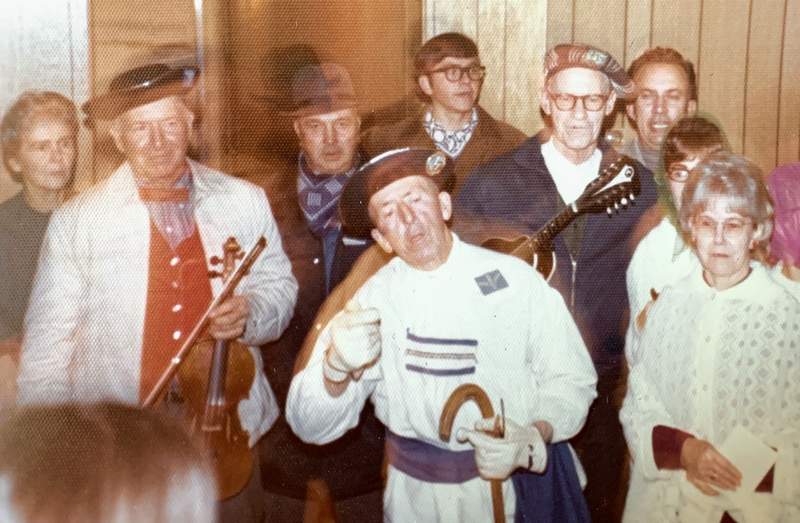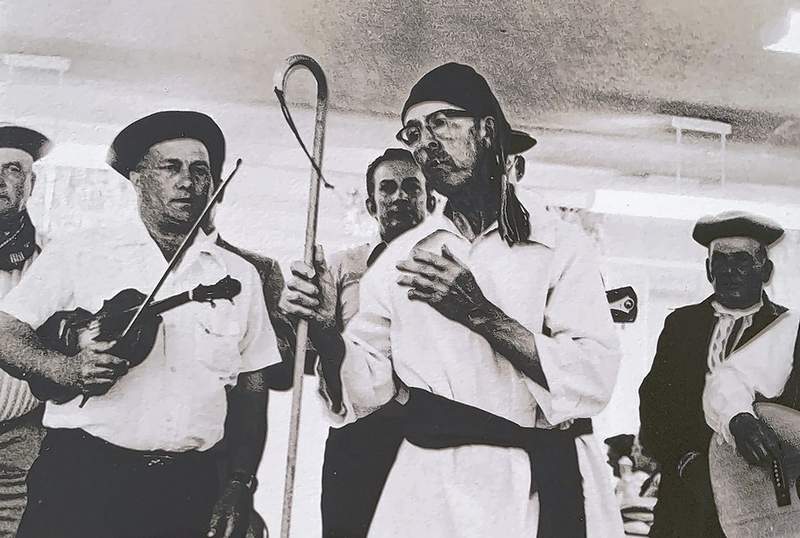Second of five parts on the 2020 inductees into the Randolph Society Hall of Fame.
The Randolph Society Foundation Board is pleased to announce that Percy Clerc, the bard of historic Prairie du Rocher, will be inducted into the 2020 class of honorees.
Percy Clerc, who descended from some of the earliest French settlers of Randolph County, was born in Prairie du Rocher in June 1902. He was the eldest of five sons born to Charles and Germania Clerc. From the start, he was integrated into the agricultural, religious and social communities of Prairie du Rocher.
Baptized and confirmed at St. Joseph's Catholic Church, he became a devoted lifelong member of the parish. After finishing the eighth grade, he left school to help his father work on the family farm, a job that became even more important after the death of his mother in 1918.
From an early age, Percy learned the stories and songs of old Prairie du Rocher from his grandmother, Sarah Louvier Albert. He composed some of his own lyrics to these folk melodies, learning French to help him better represent and understand the town's colonial past. He published two books of songs and poems inspired by her stories: "La Chansonnier de Prairie du Rocher" and "Echoes of Old Prairie du Rocher."
As a child, Percy began participating in one of the most unique Prairie du Rocher traditions: the annual singing of La Guiannee. Costumed singers and musicians gather in the small town every New Year's Eve and travel from house to house, serenading local residents.
The song, always sung in French, extends wishes for a happy new year and then asks the residents for refreshments. After partaking, the group heads to the next home to sing again for both good wishes and good food and drink. Percy's father, Charles, had been singing the Guiannee since he was a child in the 1870s, and he introduced his sons to the tradition.
Percy felt a keen sense of responsibility to help keep traditions like La Guiannee alive. After his father retired as one of the group's leaders, Percy took over, leading the singing and keeping time with the tapping of his cane. His unique corn husk costume made him instantly recognizable.
During his time with the group, their singing was preserved on a recording, now held in the Library of Congress. Percy and the Guiannee singers often performed at folk festivals, and on one occasion, they even entertained a government representative from France.
One of his nieces says if it had not been for his dedication to save La Guiannee, it likely would have ended.
Percy was a key part of keeping the history of the community alive, as he also helped revive traditions like the annual Twelfth Night Ball. Percy continued to lead the singing of La Guiannee for the rest of his life.
In December 1980, he performed it for the final time. On Jan. 12, 1981, Percy was at home in his small house on the Clerc family farm when the building caught fire. Seventy-eight-year-old Percy perished in the blaze. There's no way to know exactly what transpired that afternoon, but the Clerc family strongly believes that Percy initially made it out of the house, but decided to go back inside to try to save his papers, which included his own poetry and songs as well as historical documents about Prairie du Rocher.
Fragments of some of these papers were later discovered in the ashes of his home. His death was felt by many to represent an end of an era for the community. Gerry Franklin, who helps carry on the Guiannee tradition in Prairie du Rocher today, noted that "When Percy died, it was almost like we turned a page here in town." For the community, Percy was "a steppingstone to the past."
Though nearly four decades have passed since Percy's death, his influence is still felt throughout Prairie du Rocher. His contributions to the community continue to be remembered and celebrated today.
Percy "felt a duty to his fellow man," Franklin explains, "and to the world in general. That's how Percy lived."
Percy Clerc seemed to innately understand a major truth about local traditions and history: they're nothing without the people who work to maintain and cherish them. Historical buildings and artifacts are important, but they need people to breathe life into them and give them meaning. Percy breathed life into the history of Prairie du Rocher for decades. He learned the stories and songs of the past and -- most importantly -- he shared them with his neighbors and friends.
The musical heritage of the community, perhaps one of the most unique and enduring historical traditions in all of Randolph County, lives on, thanks to the efforts of devoted citizens like Percy Clerc.
• For a more detailed biography of Percy Clerc, visit randolphsociety.org.


